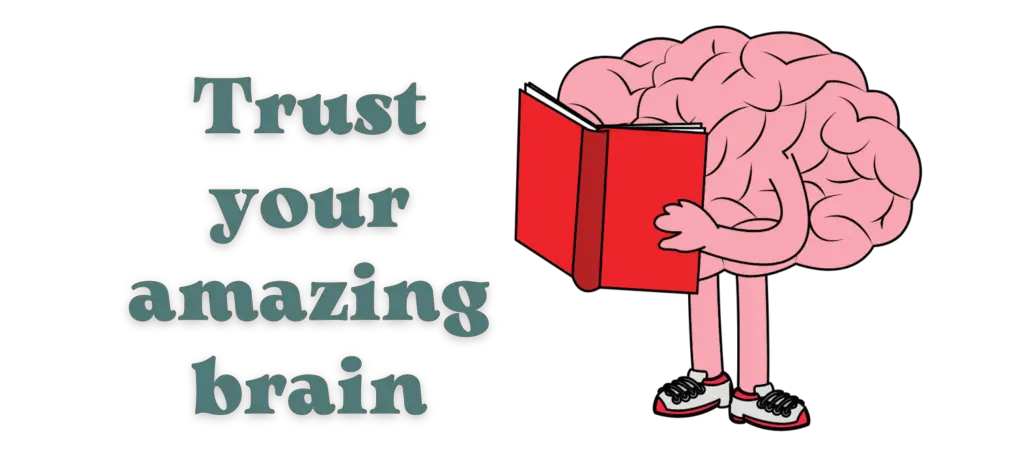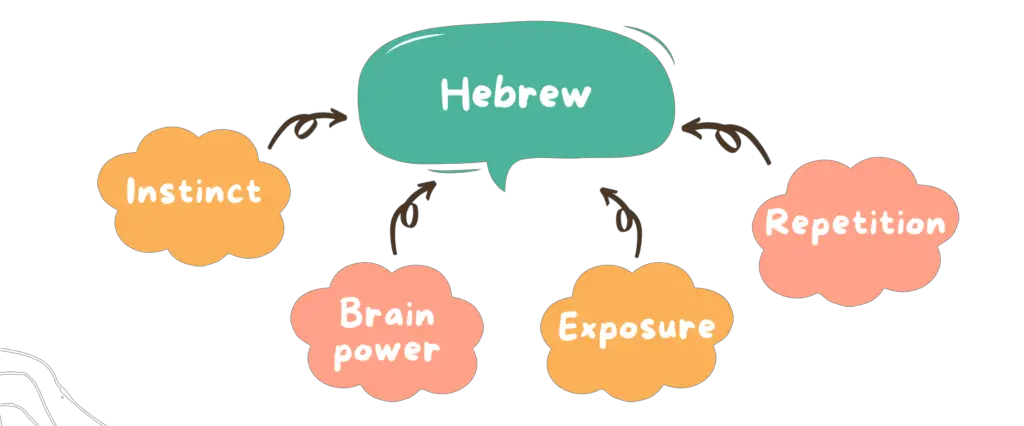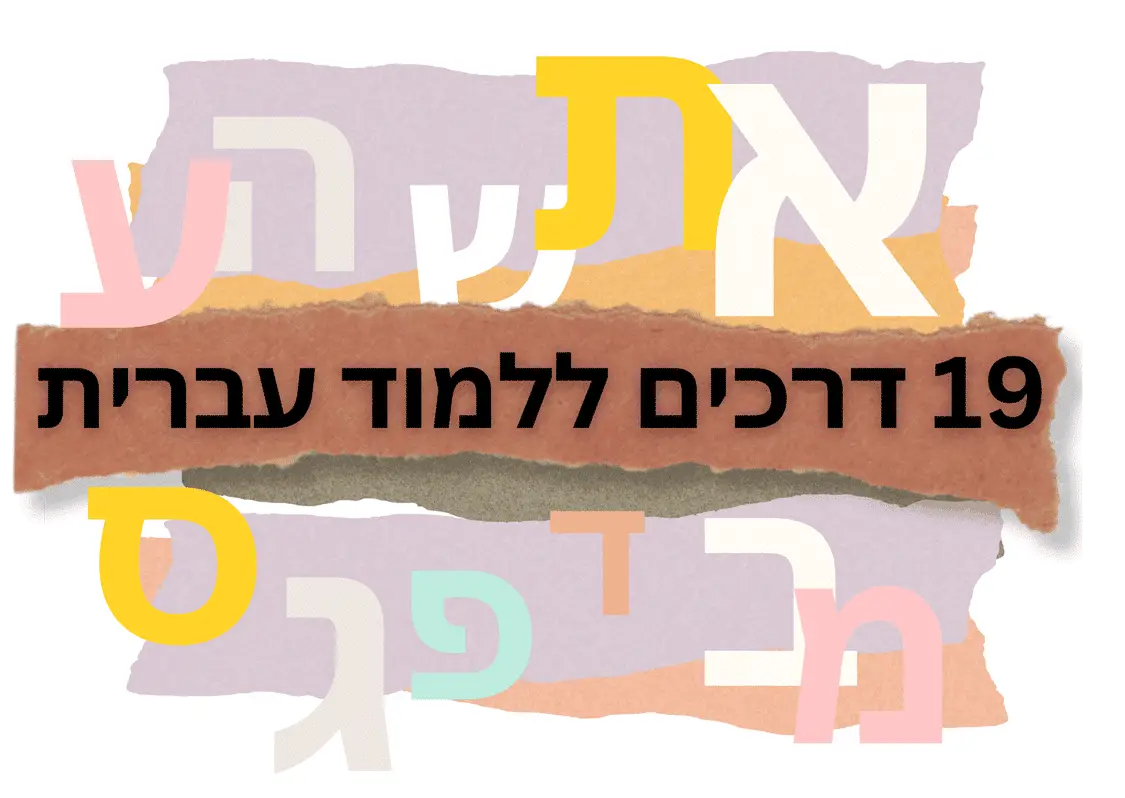Are you ready? Read the following Hebrew (phonetical) sentence out loud:
Ani yachol laasot et zeh!
Congratulations! You’ve just spoken Hebrew. And you said, “I can do it!”
This little exercise highlights three essential principles of language learning that I hold dear as a teacher.
 Believe in yourself. Because you CAN do it.
Believe in yourself. Because you CAN do it.
Repeat “Ani yachol laasot et zeh” as often as you can, and avoid any negative self-talk during your Hebrew learning journey. Why? Because emotions play a huge role in language learning, and being kind to yourself is crucial. And when you’re out there expressing yourself in Hebrew, confidence is a game-changer.
 Start speaking.
Start speaking.
Don’t start with the alphabet. Don’t start with individual vocabulary words. Just start speaking, even if you don’t know what you’re saying. It may seem strange, but trust me—it works! By reading phonetically written texts out loud, like the sentence above, you can practice speaking and develop an ear for the language starting right now. The “out loud” part is important! Remember, you learn to speak with your lips, not your eyes.
 Repeat. Repeat. And then repeat some more.
Repeat. Repeat. And then repeat some more.
Repetition is key. The more you practice, the more you’ll internalize the language. So, let’s repeat that original sentence once more:
Ani yachol laasot et zeh!
Great! Next, we’ll explore some of the best ways to learn Hebrew as a beginner.
Let’s get into it!
Or, as they say it in Hebrew – Bo-u nikaness lazeh! (Say it out loud!)

The Amazing History of Hebrew
Before diving into the practical aspects of learning Hebrew, let’s take a moment to appreciate the remarkable history of this ancient language. Hebrew was considered a dead language for many centuries, as its use was mostly limited to religious texts and contexts after the destruction of the Second Temple in 70 CE. However, it experienced a remarkable revival in the late 19th and early 20th centuries. Today, Hebrew is spoken by millions of people and is the official language of Israel. This incredible comeback story in the modern era is a unique linguistic achievement, adding a layer of depth and intrigue to your Hebrew learning journey.
What Are the Best Ways to Learn Hebrew?
Right off the bat I want you to know that there will be no grammar instruction in the methods below.
As someone who is interested in how things work, I admit that I enjoy the intricacies of grammar. However, as a language teacher, I have seen that an over-emphasis on “rules” often disrupts the pathway to fluency, especially for a beginner. After all, you can’t think of what you want to say AND about the rules at the same time.
I’m not saying that grammar rules are irrelevant, just that there’s a time and a place for them. My own experience learning Hebrew taught me that.
I became fluent by reading the newspaper out loud every day (even though I didn’t understand what I was reading at first), watching TV (even though I didn’t understand what they were saying for a long time), and having Israeli friends who wanted me to learn Hebrew. Not a bit of grammar in the mix.
I understood then that languages have a bit of magic in them. We experienced it when we were children acquiring our own language well before we understood the concepts of past, present, and future, or singular and plural.
So let’s rediscover the magic.

1. Reading Out Loud
Reading texts in Hebrew out loud is one of the most effective methods of absorbing the language that I know of. And it’s free.
Practicing reading texts out loud improves your pronunciation, fluency, and confidence in speaking Hebrew. Try to dedicate at least 5 minutes a day (more if you can). This method requires consistency, so small bursts are ok.
This method used to rely on searching for appropriate texts, however with the AI tool ChatGPT available for all to use freely, you can easily generate custom texts tailored to your skill level and, more importantly, your interests. Our post 7 Ways to Use ChatGPT to Learn a Language offers a more in-depth look at this as well as some of the following methods.
2. Custom Advanced Texts with Specific Vocabulary
As your Hebrew skills progress, request more advanced texts from ChatGPT with specific vocabulary related to your interests or career. This will help you build a rich, context-specific vocabulary that makes your Hebrew learning more relevant and enjoyable. When you prompt it for texts, ask it to include your specified vocabulary.
3. Transliteration of Texts with ChatGPT
Even before you master the Hebrew alphabet, ChatGPT can help you by transliterating Hebrew texts into the Latin alphabet. This allows you to start practicing your reading and pronunciation skills right away. And in the meantime, you can practice recognizing the Hebrew letters with this game.
4. Sample Sentences with ChatGPT
Studying words in context is always preferable to individual words. Use ChatGPT to generate sample sentences that demonstrate proper Hebrew grammar and syntax. Study these sentences to develop an intuitive understanding of the language and its structure by saying them out loud and repeating them often.
5. Word Definitions and Explanations
ChatGPT can be your tireless language companion. Ask it for definitions, synonyms, and explanations of Hebrew words and phrases to expand your vocabulary and deepen your understanding of the language. Or if you’d like a more in-depth exploration, there are many blogs that explore commonly used words, like this one about the Hebrew word for love, or this one about how to say thank you in Hebrew.
6. ChatGPT Generated Learning Materials and Practice Resources
Use AI-generated resources like worksheets, quizzes, and practice exercises to reinforce your Hebrew knowledge and test your skills. All you have to do is tell ChatGPT that you’d like to practice some vocabulary words in context. Then, paste the words that you’re interested into the prompt, and ask for custom quizzes. The great thing about ChatGPT is that it can be your language learning partner, available for you day or night.
7. Study the Hebrew Alphabet
As I’ve already mentioned, you don’t have to learn the alphabet first, but you will have to learn it eventually if you plan on communicating effectively with Hebrew-speaking people, or interacting in Hebrew-speaking cultural activities. There are many online websites that teach the alphabet, and you can even ask ChatGPT for help with that. If you’re a beginner, and know what the letters look like but aren’t sure of their names, the WordTap Hebrew letter game I mentioned above can help you practice.
8. Hebrew Language Mobile Games
Besides ChatGPT, there are many other online games for vocabulary practice. For example, our very own WordTap is a free vocabulary game that you can play either with a built-in dictionary of the 2500 most frequently used words or customize it with your own list to play with. The thing to remember is that the more you interact with the language the more you will learn. So download and play mobile games designed for Hebrew language learners. These games are fun and interactive ways to practice your language skills while enjoying downtime.

9. Sing Hebrew Songs
Expose yourself to authentic Hebrew music. Singing ranks up there with reading out loud, and it may even have an advantage that music, rhyme, and enjoyment offer. Songs can also help you learn colloquial expressions and gain insight into Hebrew culture.
10. Label Items in Your Home
Get out your sticky notes and label common household items in Hebrew to reinforce your vocabulary. Seeing these words every day will help you memorize them more effectively and naturally integrate them into your daily life.
11. Flashcards, Mnemonics, and Spaced Repitition Techniques
Use flashcards and mnemonics to memorize vocabulary and phrases. Many digital flashcard apps are available that incorporate AI to optimize the learning process. Or go with the good old paper ones that you can make yourself. The physical act of writing down words and their definition on little cards in itself aids in memory retention. The Goldlist Method also incorporates the power of handwritng while utilizing systematic spaced repitition. Mnemonics involves creating a mental image to help you remember something.
12. Hebrew Language Blogs and Websites
When you start to feel a little adventerous, look up some Hebrew language blogs and websites to read articles, stories, and news in Hebrew. Through my students, I’ve discovered that anything you need to learn, be it for work or pleasure, can be an effective opportunity to learn your target language. Do you like cooking? Look for your next recipe in Hebrew and see how you do. Want to learn about something new? Do a search in Hebrew. If you’re unsure of the Hebrew, just ask ChatGPT. This will help improve your reading skills and provide valuable cultural context.
13. YouTube Videos, Hebrew Movies and TV Shows
I turn to YouTube a lot when I want to learn something new. And a great way to learn a new language is to learn about something you love – in that new language! So subscribe to Hebrew-speaking YouTube channels and watch video content to improve your listening and speaking skills. Many channels offer language lessons, cultural insights, or vlogs in Hebrew.
14. Journaling in Hebrew
Start a daily or weekly journal in Hebrew to practice your writing skills. This exercise will help you think in Hebrew and express your thoughts more naturally in the language. You can use ChatGPT to check your Hebrew if you’d like but don’t worry too much about accuracy here. The point of this exercise is to become comfortable expressing yourself in Hebrew.

15. Immersion Trips
Plan a trip to Israel or other Hebrew-speaking communities to immerse yourself in the language and culture. This experience will dramatically improve your speaking and listening skills and deepen your connection to the language.
16. Virtual Reality Immersion
Immerse yourself in the Hebrew-speaking world without leaving your home by using Virtual Reality (VR) immersion technology. Put on a VR headset and be transported to Israel or other Hebrew-speaking environments. Practice your listening and speaking skills in a virtual setting that closely mimics real-life experiences.
17. Read Children’s Books in Hebrew
You may want to start with simple children’s books in Hebrew to build your reading skills and expand your vocabulary. Then, as you progress, move on to more advanced books and texts.
18. Hebrew-Language Newspapers and Magazines
Read Hebrew-language newspapers and magazines to improve your reading skills and stay informed about current events. This will also expose you to a wide range of vocabulary and real-life language usage.
19. Hebrew Language Meetups, Online Communities and Forums
Attend local or virtual Hebrew language meetups to practice speaking Hebrew with others in a social setting. These meetups, be it through Hebrew study groups, language clubs, or online communities, provide opportunities to make new friends, exchange ideas, receive valuable feedback on your language skills, exchange resources, and provide mutual support.
How to Stay Motivated
Let’s take a look at some strategies that can keep you inspired and engaged throughout your language learning journey.
Know your “why”: Take a moment to write down why you wanted to learn Hebrew in the first place. Being able to refer to that written note will come in handy when motivation is low to remind you what sparked your passion in the first place.
Set achievable goals: Break down your objectives into smaller, manageable tasks and make a plan to tackle them step by step. Remember, every small accomplishment counts!
Embrace a fun routine: Establish a consistent schedule for working on your Hebrew, and make it an enjoyable part of your day. When learning is fun, motivation comes naturally.
Connect with like-minded learners: Find others who share your passion for Hebrew, and support each other as you make progress together. A little camaraderie goes a long way!
Add a touch of excitement: Discover ways to make the learning process enjoyable and engaging. When you’re passionate about what you’re doing, motivation flows easily.
Practice patience and understanding: Remember that learning takes time, and setbacks are a normal part of the process. Be kind to yourself and appreciate your progress, no matter the pace.
Treat yourself for milestones: When you achieve a significant goal or make meaningful progress, reward yourself with something enjoyable. It’s a great way to stay motivated!
Recharge and refocus: Don’t forget to take breaks and engage in activities that help you relax and refocus. It’s essential to prevent burnout and maintain your enthusiasm for learning Hebrew.
With these strategies in mind, you’ll be well-equipped to stay motivated and inspired as you learn Hebrew.
Wrapping up
In this post, we’ve explored 19 ways to learn Hebrew, from time-tested methods such as reading out loud and flashcards to modern-day AI tools such as ChatGPT. By embracing a no-stress and intuitive approach to language learning you can make significant progress in your Hebrew learning journey. The key to success is to enjoy the process, stay curious, and remember to repeat our core mantra often: Ani yachol laasot et zeh. You can do it!




